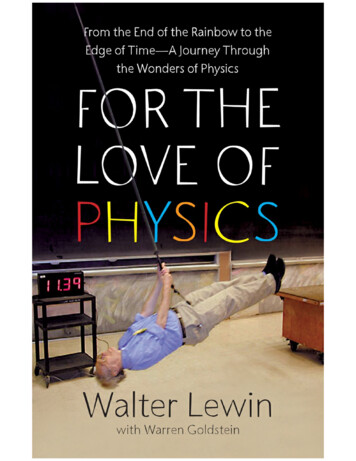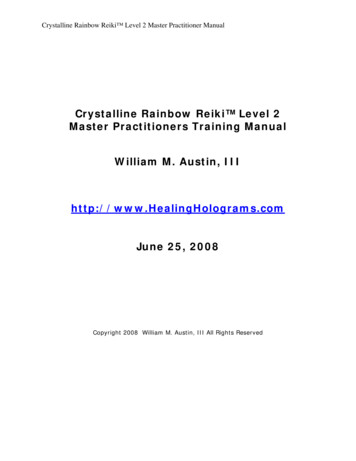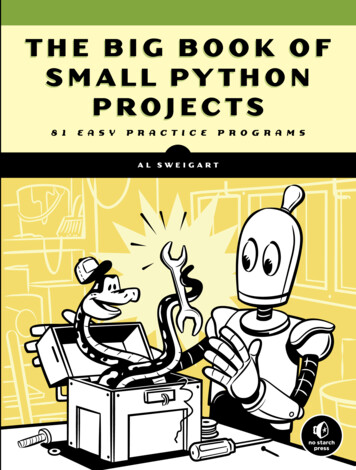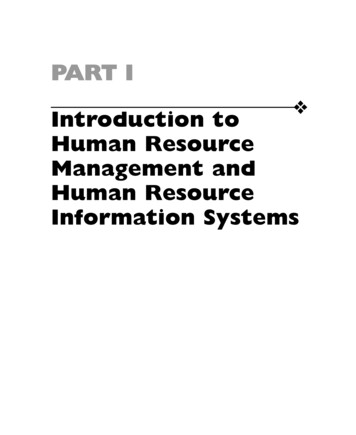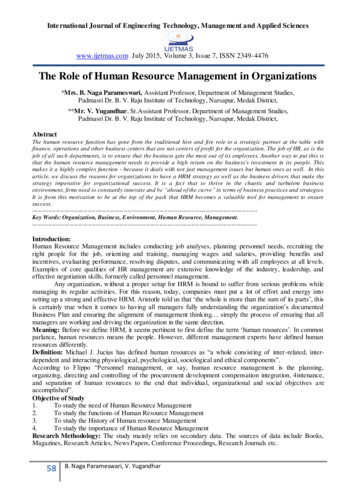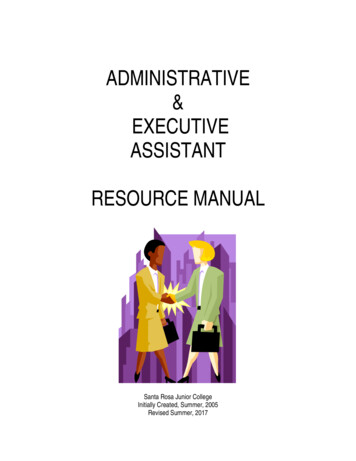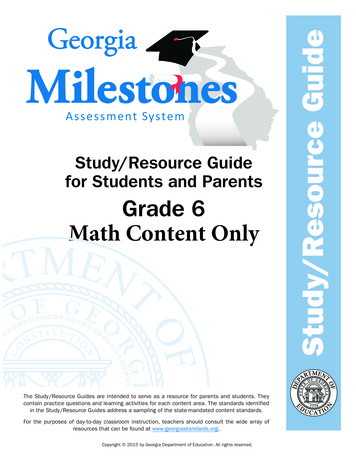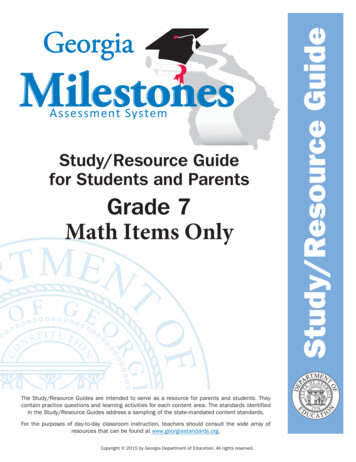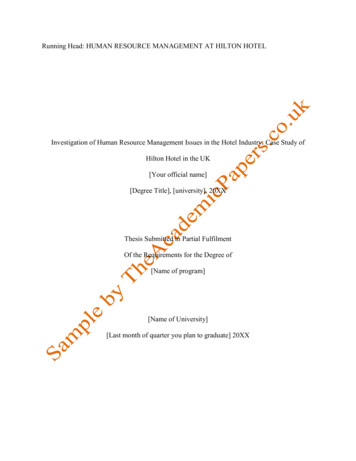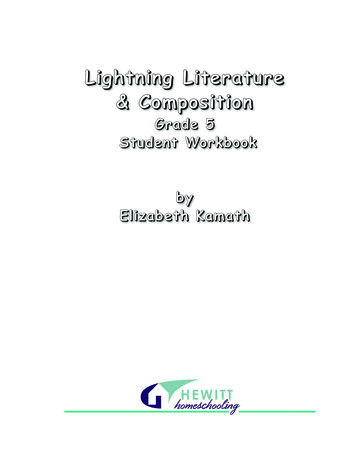
Transcription
Lightning Literature& CompositionGrade 5S t u d e n t Wo r k b o o kbyElizabeth Kamath
Table of ContentsWeek 1: The Mighty Miss Malone by Christopher Paul Curtis. . . . . . . . . . . . . . . . . . . . 1Week 2: The Mighty Miss Malone . . . . . . . . . . . . . . . . . . . . . . . . . . . . . . . . . . . . . . . . . 13Week 3: The Mighty Miss Malone . . . . . . . . . . . . . . . . . . . . . . . . . . . . . . . . . . . . . . . . . 29Week 4: Holes by Louis Sacher . . . . . . . . . . . . . . . . . . . . . . . . . . . . . . . . . . . . . . . . . . . 45Week 5: Holes. . . . . . . . . . . . . . . . . . . . . . . . . . . . . . . . . . . . . . . . . . . . . . . . . . . . . . . . . . 61Week 6: Holes . . . . . . . . . . . . . . . . . . . . . . . . . . . . . . . . . . . . . . . . . . . . . . . . . . . . . . . . . 71Week 7: Poems: Unit 1 First Steps and Rhyme . . . . . . . . . . . . . . . . . . . . . . . . . . . . . . 83Week 8: Number the Stars by Lois Lowry . . . . . . . . . . . . . . . . . . . . . . . . . . . . . . . . . . 105Week 9: Number the Stars. . . . . . . . . . . . . . . . . . . . . . . . . . . . . . . . . . . . . . . . . . . . . . . 119Week 10: Boy: Tales of Childhood by Roald Dahl . . . . . . . . . . . . . . . . . . . . . . . . . . . . 133Week 11: Boy: Tales of Childhood . . . . . . . . . . . . . . . . . . . . . . . . . . . . . . . . . . . . . . . . 145Week 12: Boy: Tales of Childhood . . . . . . . . . . . . . . . . . . . . . . . . . . . . . . . . . . . . . . . . 157Week 13: Poems: Unit 2 Figures of Speech . . . . . . . . . . . . . . . . . . . . . . . . . . . . . . . . . 169Week 14: The Tripods by John Christopher . . . . . . . . . . . . . . . . . . . . . . . . . . . . . . . . . 189Week 15: The Tripods . . . . . . . . . . . . . . . . . . . . . . . . . . . . . . . . . . . . . . . . . . . . . . . . . . . 201Week 16: The Tripods . . . . . . . . . . . . . . . . . . . . . . . . . . . . . . . . . . . . . . . . . . . . . . . . . . . 215Week 17: Brown Girl Dreaming by Jacqueline Woodson . . . . . . . . . . . . . . . . . . . . . . 227Week 18: Brown Girl Dreaming. . . . . . . . . . . . . . . . . . . . . . . . . . . . . . . . . . . . . . . . . . . . 239Week 19: Brown Girl Dreaming. . . . . . . . . . . . . . . . . . . . . . . . . . . . . . . . . . . . . . . . . . . . 247Week 20: Poems: Unit 3 Sound . . . . . . . . . . . . . . . . . . . . . . . . . . . . . . . . . . . . . . . . . . 261Week 21: The Phantom Tollbooth by Norton Juster. . . . . . . . . . . . . . . . . . . . . . . . . . . 285Week 22: The Phantom Tollbooth . . . . . . . . . . . . . . . . . . . . . . . . . . . . . . . . . . . . . . . . . 297Week 23: The Phantom Tollbooth. . . . . . . . . . . . . . . . . . . . . . . . . . . . . . . . . . . . . . . . . . 311Week 24: The Phantom Tollbooth . . . . . . . . . . . . . . . . . . . . . . . . . . . . . . . . . . . . . . . . . 323Week 25: The Phantom Tollbooth . . . . . . . . . . . . . . . . . . . . . . . . . . . . . . . . . . . . . . . . . 333Week 26: I Am Malala by Malala Yousafzai . . . . . . . . . . . . . . . . . . . . . . . . . . . . . . . . . . 343Week 27: I Am Malala . . . . . . . . . . . . . . . . . . . . . . . . . . . . . . . . . . . . . . . . . . . . . . . . . . . 353Week 28: I Am Malala. . . . . . . . . . . . . . . . . . . . . . . . . . . . . . . . . . . . . . . . . . . . . . . . . . . . 365Week 29: I Am Malala. . . . . . . . . . . . . . . . . . . . . . . . . . . . . . . . . . . . . . . . . . . . . . . . . . . . 375Week 30: Poems: Unit 4 Speakers, Endings, and Review. . . . . . . . . . . . . . . . . . . . . . 387Week 31: Anne of Green Gables by Lucy Maud Montgomery . . . . . . . . . . . . . . . . . . . 405Week 32: Anne of Green Gables. . . . . . . . . . . . . . . . . . . . . . . . . . . . . . . . . . . . . . . . . . . 415Week 33: Anne of Green Gables. . . . . . . . . . . . . . . . . . . . . . . . . . . . . . . . . . . . . . . . . . . 425Week 34: Anne of Green Gables. . . . . . . . . . . . . . . . . . . . . . . . . . . . . . . . . . . . . . . . . . . 435Week 35: Anne of Green Gables. . . . . . . . . . . . . . . . . . . . . . . . . . . . . . . . . . . . . . . . . . . 445Week 36: Anne of Green Gables. . . . . . . . . . . . . . . . . . . . . . . . . . . . . . . . . . . . . . . . . . . 455Appendices: . . . . . . . . . . . . . . . . . . . . . . . . . . . . . . . . . . . . . . . . . . . . . . . . . . . . . . . . . . . . . . 467
e Mighty Miss MalonebyChristopher Paul CurtisIllustration by Maryia KapitsaLightning Lit 5Week 3: Chapters 25–AfterwardPage 29
Week 3Student ChecklistThis week you will:Read chapters 25–33 and the Afterward in The Mighty Miss Malone Chapters 25–27 Answer comprehension questions, Workpage 31 Chapters 28–30 Answer comprehension questions, Workpage 34 Chapters 31–33 and the Afterward Answer comprehension questions, Workpage 37 Engage in a book discussion on The Mighty Miss Malone, Pages 41–42Complete grammar pages in Worktext Adjectives, Workpage 33 Adverbs, Workpage 36 Comparative/Superlative, Workpage 40 Diagraming, Workpage 43Finish your research paper on an important sports event Begin the rough draft Finish the rough draft Review the rough draft Complete the final draftDo extra activities (optional) Page 30Lightning Lit 5
ReadingWeek 3–Day 1Read chapters 25–27 of The Mighty Miss Malone.QuestionsAnswer the following questions:1. Why do Deza and her mother leave the camp?2. Why does Deza have to ignore some words in some novels?3. Why might Deza and her mother not yet have heard from Jimmy?Grammar: AdjectivesBy now, you may know that words like tiny, red, and clever are adjectives. These wordsdescribe nouns. But there are many other types of adjectives you may not realize areadjectives. Any word which modifies a noun in some way is an adjective. Here are someexamples:The apple is delicious.My apple is delicious.That apple is delicious.The two apples are delicious.That apple is mine.Which apple do you want?Several apples fell from the tree.You probably know that delicious is an adjective. This type is called a descriptiveadjective, and it’s the type we most often think of. But all the underlined words above areadjectives—not just delicious. All of them do something to tell us more about the apple.Let’s look at them a little more closely.Lightning Lit 5Page 31
Week 3–Day 1ARTICLES AS ADJECTIVESThe, a, and an are articles, but they are also adjectives. The is adefinite article; a and an are indefinite articles. We use a beforewords that start with a consonant sound (baby, unicorn) and an beforewords that start with a vowel sound (apple, hour). A and an can onlycome before singular nouns, and they mean something in general.The can come before singular or plural nouns, and refers to specificthings. If I say, “The apple is delicious,” I’m talking about a specificapple. If I say “An apple is delicious,” I mean apples in general.PRONOUNS AS ADJECTIVESPossessive pronouns that come before a noun (my, your, their, etc.) are adjectives. Theytell us who the noun belongs to. This is my apple, that is your apple, those are their apples.NUMBERS AS ADJECTIVESWhen a number tells us how many of a noun, it’s called a counting adjective. Words thatindicate how many but aren’t specific numbers (many apples, some apples, etc.) are alsoadjectives.DEMONSTRATIVE ADJECTIVESDemonstrative may be a new word to you, but you probably know demonstrate. Pictureyourself demonstrating a new invention of yours, pointing to the various parts as you speak.“This thingamabob,” “That doohickey,” “These whatsits.” This, that, these, and those aredemonstrative adjectives when they come before the noun. (If you just say “I want those,”then it’s a demonstrative pronoun.)INTERROGATIVE ADJECTIVESThese are adjectives that you use to help ask questions (orinterrogate someone). There are only three: which, what, whose.Just like all other adjectives, they must go with a noun: Whichapple do you want? What books did you get from the library?Whose jacket is this? (If you just say “What did you buy?” you’reusing what as an interrogative pronoun.)Page 32Don’t worry—I’m not going to quiz you on the technical names ofthese adjectives. It’s just important that you can spot all types ofadjectives, not just the one that tell us what someone looks like orhow they act.Lightning Lit 5
Week 3–Day 1Underline all adjectives in the sentences. Draw arrows to show what words they aremodifying.Example: My dinner was cold before the chocolate dessert was ready.1. There are three beautiful dogs sitting at your table.2. Whose wet clothes are on this chair?3. The Depression meant difficult times for many people.Write your own sentence using a descriptive adjective, a demonstrative adjective, and apossessive pronoun as an adjective.4.Write your own sentence using an interrogative adjective, an article, and a countingadjective.5.Lightning Lit 5Page 33
Week 3–Day 2ReadingRead chapters 28–30 of The Mighty Miss Malone.QuestionsAnswer the following questions:1. How does Deza get into the New Turned Leaf?2. How do you think Deza feels when she hears Jimmy’s story about what really happened on Lake Michigan?Grammar: AdverbsJust as there are many types of adjectives, there are many types of adverbs. Likeadjectives, adverbs modify other words. Unlike adjectives, which modify nouns, adverbsmodify verbs, adjectives, and other adverbs. They are divided into types by what questionthey answer.HOW?Some adverbs answer how, or in what manner, something is done: speedily, poorly,carefully. Most of these adverbs end in ly, though some don’t (well, fast, hard).Deza did well in school.Jimmy sang beautifully.WHEN?Some adverbs tell when something was done. Some examples include yesterday,tomorrow, early.You are learning about adverbs now.You will finish your paper soon.Page 34Lightning Lit 5
WHERE?Week 3–Day 2Some adverbs tell where something was done. Someexamples include inside, near, and upstairs.To Peggy, Flint felt far from home.Deza ran downstairs when she heard her fatherleave.HOW OFTEN?Another thing we sometimes need to know is how oftensomeone does something. Adverbs that answer thisquestion include frequently, always, and never.GaryDeza usually did better than everyone else in class.Jimmy rarely finished his homework.TO WHAT DEGREE?Many adverbs answer this question, and these are the adverbs that often modify adjectivesor other adverbs. They can strengthen (extremely) or weaken (barely) these words.Deza worked very hard on her papers.Roscoe almost never yelled at his children.Lightning Lit 5Page 35
Week 3–Day 2Underline the adverbs in these sentences, and draw an arrow to show what word eachadverb modifies. If you aren’t sure, it can help to identify the verbs first. Then ask yourselfwhat words tell more about those verbs. This won’t necessarily find all the adverbs(because they can also modify adjectives and other adverbs), but it will be a good start.Example: Yesterday, he quite suddenly threw the ball outside.1. Deza is too tired to carefully review her work tonight.2. Roscoe trudged upstairs very slowly, and it greatly worried Peggy.3. Jimmy never cared about school, and was much happier singing nightly in clubs.Write your own sentence using three adverbs. Choose three different types, but whichtypes are up to you.4.Write a sentence using two adverbs of the types you didn’tchoose for the previous sentence.5.Page 36Lightning Lit 5
Week 3–Day 3ReadingRead chapters 31–33 and the Afterward of The Mighty Miss Malone.QuestionsAnswer the following questions:1. What surprise does Jimmy have for Deza?2. Four good things happen to Deza very close together: She finds Jimmy, she getsher teeth fixed, she and her mother move back to Gary, and they find her father.Which of these do you think is most important for Deza’s welfare? Why?Grammar: Comparatives and SuperlativesIn addition to their powers of modifying other words, adjectives and adverbs share anothertrait: They can both be comparative or superlative. Comparative means they’recomparing two things. Superlative means they’re comparing three or more things.1 SyllableLightning Lit 53 Syllables2 SyllablesADJECTIVESTo know how to form the comparative andsuperlative, adjectives can be divided into threegroups: those with one syllable (big) those withthree syllables (impressive) and those with twosyllables (tiny, pleasant). You’ll see why I usedthis weird order in a minute.Page 37
Week 3–Day 3Adjectives with one syllable add er to form the comparative and est to form the twisestYou may have noticed some spelling changes there. Ifthe word ends in a single consonant preceded by a shortvowel, double the consonant then add the suffix (bigger).If it ends in a y preceded by a consonant, change the yto i then add the suffix (drier). If the word ends in an e,just add an r or st (wisest).Adjectives with three or more syllables form the comparativeby adding more (more impressive) and the superlative byadding most (most impressive).Adjectives with two syllables can go either way. That’s why I put them last. If English isyour first language, you’ll probably just know which way to use because the other will soundwrong (peacefuler? most happy?). No—we’re happiest when it’s more peaceful. Somewords can be puzzling—more pleasant is preferred, but pleasanter works too. To makethings more confusing (never confusinger), some of them really can go both ways. Eventhe strictest English teacher will be happy if you’re friendlier than I am, or more friendly thanyour neighbor.ADVERBSAdverbs are simpler. Almost all adverbs form the comparative by adding more (moreslowly) and the superlative by adding most (most slowly).Most of the adverbs that aren’t formed this way add er and est. This is true of words thatsometimes function as adjectives and sometimes as adverbs, words like early, late, fast,hard, and straight. (I woke earlier than you, but because you drove faster, I arrived at theconcert later.)EXCEPTIONSEnglish is full of exceptions, and comparatives and superlatives are no exception. (Seewhat I did there?) Our first exception is fun. I don’t mean it’s enjoyable, I mean literally theword fun. Fun is an adjective with one syllable that uses more and most instead of er andest:funPage 38more funmost funLightning Lit 5
Week 3–Day 3Then there are these irregular fartherbestworstmostleastfarthestAnd these irregular stworstleastfarthestNotice how well maps onto the adjective good and badly onto bad. Little and far are thesame as adjectives and adverbs. So there aren’t as many exceptions as it seems. FlintShow where Deza went in the book.Lightning Lit 5Page 39
Week 3–Day 3Fill in the blanks in the erthinnerwellPage 40most TIVEmore easilySUPERLATIVEfarthestLightning Lit 5
ReadingWeek 3–Day 4Here are some questions to consider when discussing The Mighty Miss Malone.Mrs. Needham says, “. . . good writing is always about telling the truth.” What do youthink Mrs. Needham means by this? Do you think she’s saying fiction writing is alwaysbad and nonfiction writing is always good, or something else? In what ways doesfiction tell the truth (even though the story it tells is made up by the writer)? What doyou think of the idea that good writing must always tell the truth in some fashion?Even though Deza gets a very good grade on her last essay of the year, at first she isstill devastated. Have you had an experience like this, where although you did verywell at something, you still didn’t live up to your own expectations? How did it feel?Did you learn something from the experience, as Deza does here?Mrs. Needham tells Deza the clothes she gives her are some a niece left at her house.Do you think that’s true? Where do you think she actually got the clothes? What fromthe book tells us this? Why do you think she would tell Deza this instead of the truth?Are there times when lying is the better thing to do? If so, when or why?In chapter seven, Deza says, “It’s funny how something can look so normal to you oneday, and then all of a sudden it can look so strange. I wonder if that’s because as youget smarter and older you look at things with different eyes, even things you’ve seen amillion times before.” Has this ever happened to you? Has something that you’veseen “a million times” suddenly looked different to you one day? If so, what was it, andwhy do you think that happened?Deza’s parents give her a good explanation about the phrase “credit to your race.”This is not something people usually say anymore, but the general idea—thatsometimes people give us warnings about what kind of person they are by what theysay—is still true. Can you think of examples of things you’ve heard people say thatwarned you they were people you should be careful about for one reason or another?Deza says, “Sometimes myths are a lot better than what really happens,” and herfather agrees. Do you agree? What are some examples? What are some thingsmyths can teach us?Deza’s father says that humor comes from tragedy and pain. What do you think of thatstatement? Can you think of examples of humor that does come from pain? Can youthink of examples of humor that doesn’t?Frequently throughout the book, Deza mentions things her mother or father do or saythat alert her or Jimmy that they’re about to hear bad news or something bad is aboutto happen. For example, she mentions the lines in her mother’s forehead as anContinuedLightning Lit 5Page 41
Week 3–Day 4indicator of how upset she is. Do either of your parentsor other family members have warning signs likethese? Do you? What are they?Deza talks about needing to skip over the details in abook that emphasize a character is white in order tobetter identify with the character. What helps youidentify with a character in a book? If the characterlooks different from you or lives in a situation that isdifferent, what things help you understand the character better and live the story withthem? Do you sometimes imagine characters in stories as a bit different than they’reactually described?My favorite sentence from this book is:What I think of this book:Grammar: DiagrammingIf you’ve completed any previous guides in this series, you’re an old hand at diagrammingsentences. But if this is your first one, fear not, we’re going to start you from the beginning.The beauty of diagramming sentences is you learn how the words function in the sentence.Before I teach you how to diagram adjectives and adverbs, we have to cover a couplebeginning steps. First we need our sentence:Deza carefully handled the beautiful material.Page 42Lightning Lit 5
Week 3–Day 4Step one is the easiest. Underline the sentence (and remove the punctuation):Deza carefully handled the beautiful materialNext we look for the subject of the sentence, who or what the sentence is about. Weseparate the subject from the rest of the sentence with a vertical line:Deza carefully handled the beautiful materialNow we’re ready for the adjectives and adverbs. Since adjectives and adverbs perform thesame function (modifying other words), we do the same thing with them when we diagramthe sentence: Hang them off the bottom of the words they modify. Notice the hangs offbefore beautiful because that’s the order they are in the sentence.ultifaubeethllyfurecaDeza handled materialYour turn. Diagram this sentence:1. Roscoe reluctantly told his sad story.One last thing. Remember that some adverbs modify other adverbs or adjectives. Thatmeans in some sentences you have words modifying words that are modifying other words.Diagrams of these sentences will have words hanging off words that are hanging off words,for example: Too many people were living in the camp.people were living in campethy oan TomYour turn:2. Joe Louis was a very famous boxer.Lightning Lit 5Page 43
Week 3–Day 4WordFindLL5 Week 3Circle the following words. Words can be horizontal and ETTERHOBOWGI EF AN KP NHQB RA QS CE ZB EA OL HL RC UYHMGNOATMEALYVUGNIHPFISHINGVYTJ N R UG C LA GO V D F JL Y UGU F DDO P I T T HI G E QH B SC O SWGM ET O S Y F K CI WA R D R OO K Y QH Y BN X O T M Y IA Y HG F S MR I N X E K ZY T R X U P IUQD E R P VH E S A U R UF U L DB B N COO R LX X G EI C L TN A I TG R B EB E R RA O A RK E R ODD YWO E H BU Z OOQ A B ASWO rowboatboxcar shingboxingfamilyletteressayDezahoboPage 44Lightning Lit 5
HolesbyLouis SacharIllustration by Maryia KapitsaLightning Lit 5Week 4: Chapters 1–18Page 45
Week 4Student ChecklistThis week you will:Read chapters 1–18 in Holes Chapters 1–5 Answer comprehension questions, Workpage 47 Chapters 6–7 Answer comprehension questions, Workpage 50 Chapters 8–12 Answer comprehension questions, Workpage 53 Chapters 13–18 Answer comprehension questions, Workpage 57Complete grammar pages in Worktext Subject, object, and possessive pronouns, Workpage 49 Reflexive, intensive, and indefinite pronouns and antecedents,Workpage 52 Conjunctions, Workpage 56 Articles and interjections, Workpage 59Write a Mad Lib Write the rough draft Remove several words from the rough draft Replace some of the words removed Write the final draftDo extra activities (optional) Page 46Lightning Lit 5
ReadingWeek 4–Day 1Read chapters 1–5 of Holes.QuestionsAnswer the following questions:1. Who owns the shade at Camp Green Lake?2. What don’t you want to get bitten by at Camp Green Lake?3. Why was Stanley often teased at school?4. What problem have all the Stanley Yelnatses had? (Stanley, his father, his grandfather, and his great-grandfather?)Grammar: Subject, Object, and PossessivePronounsPronouns are those words that take the place of nouns. There are many types ofpronouns.Subject pronouns are pronouns that are the subject ofa sentence or phrase: I, we, you, he, she, it, and they.Any of these can be the subject of a sentence:i am writing about grammar.You are learning about grammar.We like talking about grammar.Lightning Lit 5Page 47
Week 4–Day 1Object pronouns are the object of some action in the sentence—often an action done by the subject. The object pronouns are me,us, you, him, her, it, and them. Notice that there is overlap betweenthe group of subject and object pronouns (you and it).Greg kicked the ball to me.Greg kicked the ball to him.Greg kicked it several times.Understanding subject and object pronouns is particularly importantwhen talking about more than one person, because that’s whenthings can get confusing. Consider these two sentences:Wanda and i are going to the store.Me and Wanda are going to the store.The second sentence is wrong for two reasons. First, you always put the other person orpeople first and yourself last. But “Wanda and me are going to the store” would be wrongtoo because you would be using the object pronoun me as the subject of a sentence.That’s why you need I. Now look at these two sentences:My mother cooked lunch for Leroy and me.My mother cooked lunch for Leroy and i.Again, the second sentence is wrong. This time you need the object pronoun me, butinstead the person has used the subject pronoun I. The subject of the sentence is mymother, not I. This type of error is very common, even for adults. Figure out the objectpronoun, and you’ll avoid this mistake for the rest of your life.When you aren’t sure which pronoun to use in this kind of situation, just remove the otherperson in your mind and it will be obvious. You would never say, “My mother cooked lunchfor I” which means you should never say, “My mother cooked lunch for Leroy and I.”We’ve already discussed possessive pronouns a bit. These are the pronouns my, mine,your, yours, his, her, hers, its, our, ours, your, yours, their, and theirs. They show thatsomeone possesses something. Sometimes they come before the noun (That is my cat)and sometimes they stand on their own (That cat is mine). In all cases, they show thatsomeone possesses something in some way.Here’s a very important thing to remember about these possessive pronouns. Unlikepossessive nouns, which always have an apostrophe (John’s), these possessive pronounsnever have an apostrophe. This is another mistake I see all the time, including from adults,especially the mistake it’s (The cat loved it’s dinner). No. This is wrong, wrong, wrong.Never do this.Page 48Lightning Lit 5
Week 4–Day 1Underline all the pronouns in these sentences. Fix any problems you find. If there is noproblem, write a C for “correct” after the sentence.heExample: Stanley and his parents had tried to pretend that him was justgoing away to camp.1. Mr. Sir told he to watch for the spotted lizards.2. Because our electricity went out, my mother and me will go to his house for dinner.3. You should submit your requests to Mr. Garland and she.4. Ms. Janson wants you and them to come with us.5. The snake vigilantly guarded it’s home from them.6. I don’t know whether the dominos belong to Matheus and he, or if they are her’s.Lightning Lit 5Page 49
Week 4–Day 2ReadingRead chapters 6–7 of Holes.QuestionsQuestionsAnswer the following questions:1. Why was Stanley so excited when the shoes fell in front of him?2. Why didn’t Elya pick a number when Myra asked him to?Grammar: Reflexive, Intensive, andIndefinite Pronouns and AntecedentsYesterday we looked at subject and object pronouns. Subjects do actions; objects receiveaction. “I [subject] throw the ball to you [object].” But what if the subject needs to dosomething to themselves?For this problem, English provides the reflexive pronoun: myself, ourselves, yourself,yourselves, himself, herself, itself, themselves. When would you use these?i wash myself every morning.ian accidentally hit himself in the eye.When you finish your essay, you should treat yourself to a cookie.Intensive pronouns look the same as reflexive pronouns, but they’re usedin a different way. They are used to emphasize who is doing something.Think of it as being very intense about saying who does an action:i made this pie myself! (Can you believe it? i usually burn water!)Do you think she wrote this paper herself? (i didn’t think she could write acomplete sentence.)We have to put on the play ourselves. (Because our director, costumer, andset designer are all sick with the flu.)Page 50Lightning Lit 5
Week 4–Day 2Again, I frequently see adults make mistakes with these pronouns, using them when theyreally want a subject or object pronoun. “Cynthia and myself would love to have you fordinner some evening.” “Have that report to Mr. Rand or myself by Friday.” These arewrong. And just like yesterday, the way to avoid this mistake is the same: Remove theother person and see what pronoun you really want there. “I would love to have you fordinner some evening.” (Since I would, certainly Cynthia and I would as well.) “Have thatreport to me by Friday.” (Oh, Mr. Rand wants to see it as well, so have it to Mr. Rand andme.)One thing the pronouns I’ve taught you so far have in common is they all needantecedents. Antecedents are the nouns that pronouns are referring to. So in thesentenceStanley wanted to fill his canteen.the antecedent for his is Stanley. That is who his refers back to.Often the antecedent will be in a previous sentence:Stanley was innocent of the crime. But he knew it would dono good to tell anyone.Here, Stanley is again the antecedent for he. Sometimes people make the mistake ofusing a pronoun without an antecedent. Don’t do this. Usually.But, when can you use a pronoun without an antecedent? Enter the indefinite pronoun.There are many indefinite pronouns, but I just want you to be familiar with some for now:anyone, someone, everyone, no one, anybody, somebody, everybody, nobody, anything,something, everything, nothing. We use indefinite pronouns to refer to an indefinite groupof people or things rather than back to specific people or things.Everyone loves a good book.Surely somebody will come to your party.Here we aren’t talking about certain people, so we have no antecedent.Lightning Lit 5Page 51
Week 4–Day 2Underline all the pronouns in these sentences and fix any mistakes you find. If a sentenceis correct, write C after it. Remember yesterday’s pronouns as well.themselvesExample: Stanley and the lightest kid in class had to weigh theirselves.1. I am hoping to visit you myself.2. Stanley told hisself that nothing bad could happen at the camp.3. Is there anything that everyone likes to do?4. Ilze and myself hope someone will join us at your house.In these sentences, underline the pronouns and draw arrows to their antecedents. (Thereare no errors in these sentences).Elya gave his pig to Myra. She did not understand why he did notchoose a number. Elya then left for America, forgetting to carry MadameZeroni up to the river, something anyone might have done. Afterwards, hewas sure she put a curse on him.Page 52Lightning Lit 5
ReadingWeek 4–Day 3Read chapters 8–12 of Holes.QuestionsAnswer the following questions:1. What nickname do the boys give Stanley?2. Although Stanley is excited at first to find the stone with the fossil, why does it endup being disappointing?Grammar: ConjunctionsConjunctions are little words that join parts of sentences. Just as there are different typesof pronouns, there are different types of conjunctions.COORDINATING CONJUNCTIONSThere are seven coordinating conjunctions, and their first letters make the word FANBOYS:for, and, nor, but, or, yet, so. Coordinating conjunctions have to join the same type ofthing on each side. For example, they can connect nouns, verbs in the same tense, oreven sentences:i’d like a salad or a sandwich.Sophie practiced and studied all weekend.Li Wei was the best player
Week 3 This week you will: Read chapters 25-33 and the Afterward in The Mighty Miss Malone Chapters 25-27 Answer comprehension questions, Workpage 31 Chapters28-30 Answer comprehension questions, Workpage 34 Chapters31-33 and the Afterward Answer comprehension questions, Workpage 37 Engage in a book discussion on The Mighty Miss Malone, Pages 41-42
